Discover the top Ecommerce Platforms of revolutionizing online businesses. robust features, these platforms offer seamless integration, secure payment gateways, and customizable templates. Boost your online’s growth and stay ahead of the competition.

What is an ecommerce platform?
An ecommerce platform is a software tool that helps businesses set up and manage online stores. It enables them to handle products, process transactions, and manage orders seamlessly. In the digital age, this platform is vital for reaching a global audience and boosting sales.
Key Features of an Ecommerce Platform
- Store Creation & Customization
Ecommerce platforms allow businesses to design tailored, branded storefronts using templates. A strong, user-friendly design enhances customer experience, encouraging engagement and conversions. - Inventory Management
Effective ecommerce platforms offer tools to track stock, manage products, and update listings. This ensures that businesses always provide accurate information, minimizing overselling risks. - Payment Processing
With secure gateways supporting various payment methods (credit cards, e-wallets), these platforms simplify transactions, ensuring customer satisfaction and increasing conversions. - Order Management
Efficient order processing, shipping label generation, and order tracking are integral. Platforms automate these tasks to ensure timely deliveries and customer satisfaction. - Marketing Tools
Built-in marketing capabilities, such as SEO optimization, social media integration, and email automation, help businesses enhance visibility and drive traffic.
Selecting the Right Platform
When choosing the best ecommerce platform, consider scalability, user-friendliness, mobile optimization, and the ability to integrate with third-party applications. These factors determine whether the platform can meet your specific business needs.
The 11 best ecommerce platforms
Are you in the process of setting up an online store and looking for the best ecommerce platform to help you reach your business goals? Look no further! In this article, we will dive into the top 11 ecommerce platforms that are poised to dominate the market in 2024. Whether you’re a small business owner or a seasoned entrepreneur, finding the right platform is crucial for success in the competitive world of online retail.
1. Shopify:
Built on WordPress, WooCommerce is a powerful ecommerce platforms that seamlessly integrates with your existing website. It offers a plethora of extensions and plugins, enabling you to customize your store according to your unique business needs.

2. WooCommerce
Built on WordPress, WooCommerce is a powerful platform that seamlessly integrates with your existing website. It offers a plethora of extensions and plugins, enabling you to customize your store according to your unique business needs.

3. BigCommerce
Known for its scalability and robustness, BigCommerce is an ideal choice for growing businesses. It offers advanced functionalities, such as multi-channel selling and inventory management, to streamline your operations and boost your sales.

4.Magento
f you’re looking for a platform that offers unparalleled flexibility and scalability, Magento is a top contender. With its open-source nature, it allows for extensive customization and integration with third-party tools.

5.WIX
Wix is a popular website builder that also offers ecommerce capabilities. It provides visually stunning templates and a drag-and-drop editor, making it perfect for entrepreneurs who prioritize design aesthetics.

6.Volusion
Aimed at small to medium-sized businesses, Volusion provides all the essential tools for setting up and managing your online store. Its user-friendly interface and comprehensive feature set make it a reliable choice.

7.Squarespace
Known for its elegant and modern templates, Squarespace offers a seamless ecommerce experience. It provides a wide array of design options and a user-friendly editor, allowing you to create a visually appealing store.

8.3dcart
Known for its elegant and modern templates, Squarespace offers a seamless ecommerce experience. It provides a wide array of design options and a user-friendly editor, allowing you to create a visually appealing store.

9. PrestaShop:
As an open-source platform, PrestaShop enables complete customization and control over your online store. Its extensive range of features, including built-in analytics and marketing tools, make it an attractive option.

10. Weebly
Trees are more important today than ever before. More than 10,000 products are reportedly made from trees. Through chemistry, the humble woodpile is yielding chemicals, plastics and fabrics that were beyond comprehension when an axe first felled a Texas tree.

11- Ecwind
If you already have an established website or blog, Ecwid is an excellent choice for adding ecommerce functionality. It seamlessly integrates with your existing platform, allowing you to start selling in no time.

In conclusion, choosing the right ecommerce platform is crucial for the success of your online store. The 11 platforms mentioned above, including Shopify, WooCommerce, and Magento, offer a variety of features and customization options to suit different business needs. Consider your budget, scalability requirements, and specific goals to make an informed decision. Remember, the right platform can significantly impact your online business’s performance and growth. So, take the time to research and choose wisely. Happy selling!
Shopify: The Leading Ecommerce Platform for 2024
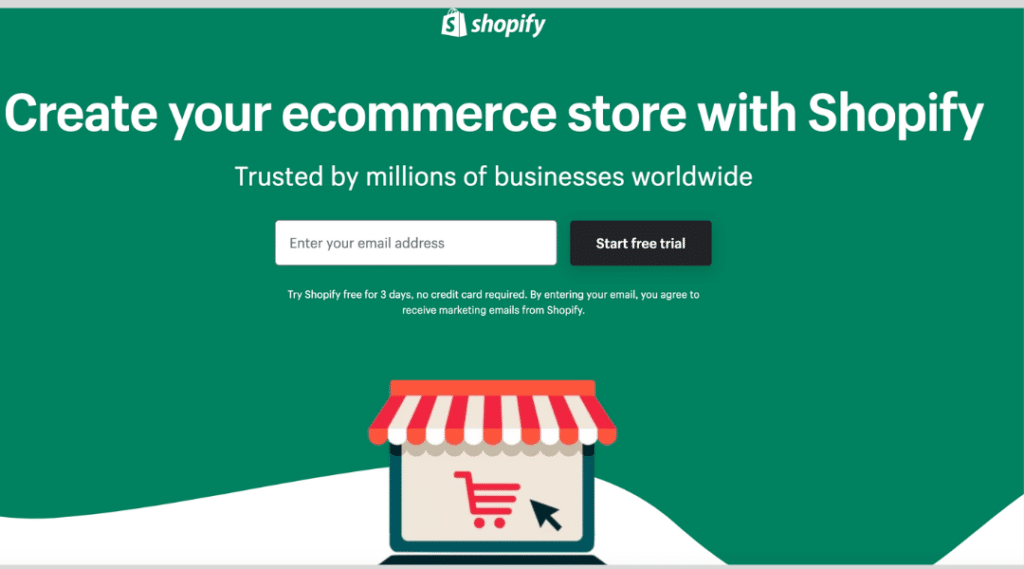
Are you an entrepreneur aiming to enter the world of online selling? Choosing the right ecommerce platform is crucial to your success. In this article, we’ll explore Shopify, the leading ecommerce platform for 2024 and beyond.
Why Shopify?
Shopify stands out because it offers user-friendly features, scalability, and advanced tools that make it easy to launch and grow an online store.
Key Benefits of Shopify:
- Intuitive Interface: Shopify’s easy-to-use platform allows even beginners with no coding experience to set up and manage their online stores. Its drag-and-drop design tools simplify customization, ensuring a seamless customer experience.
- Extensive App Store: Shopify’s App Store includes over 4,200 apps. From marketing and sales tools to inventory management, you can expand your store’s capabilities with ease, optimizing every part of your business.
- Mobile Responsiveness: In today’s mobile-first world, Shopify ensures your site looks perfect across all devices, providing an optimized, smooth shopping experience on any screen size.
- Built-In SEO Tools: Shopify boosts your store’s visibility with strong SEO features. You can easily optimize meta tags, URLs, and headings, increasing your chances of ranking higher in search results and attracting organic traffic.
- Secure and Reliable: Shopify guarantees security with built-in SSL certificates, hosting, and backups. You can focus on growing your business without worrying about the technical aspects.
- Seamless Integration: Shopify integrates effortlessly with third-party platforms, making it easy to connect your store with tools for accounting, marketing, and shipping, streamlining business operations.
- 24/7 Support: Shopify offers round-the-clock support through live chat, email, or phone, so help is always available.
Why Shopify is the Best for 2024
Shopify remains the best choice due to its user-friendly interface, mobile-first approach, robust SEO tools, and continuous support. Its wide integration options and scalable design help businesses of all sizes succeed.
Ready to start? Join Shopify and build your ecommerce store today to thrive in the fast-evolving world of online business.
1 – Wix: A Top Ecommerce Platform for 2024

Are you ready to take your business online and searching for the best platform to create your store? Look no further than Wix. With its user-friendly tools, versatility, and cutting-edge features, Wix is the go-to ecommerce platform in 2024.
Why Choose Wix in 2024?
1. Easy to Use
Wix’s intuitive drag-and-drop editor allows anyone, even without coding experience, to design and customize a professional-looking online store. This makes it accessible for entrepreneurs of all levels.
2. Strong Ecommerce Features
Wix supports a full range of ecommerce functions, from inventory management to secure payment processing. With integrated customer relationship management (CRM) tools, you can seamlessly manage your store, orders, and customer interactions in one place.
3. Mobile-Responsive Designs
In 2024, mobile optimization is crucial. Wix provides mobile-friendly templates that automatically adjust to different devices, ensuring a smooth shopping experience for your customers whether they’re on a phone, tablet, or desktop.
4. SEO-Friendly
Wix includes built-in search engine optimization (SEO) tools. You can easily optimize meta tags, URLs, and content to improve your store’s ranking in search engine results, helping you attract more organic traffic.
5. Security and Reliability
Security is a top concern for any online store. Wix ensures your site is protected with SSL encryption and secure payment gateways. Plus, their reliable infrastructure keeps your site running smoothly with minimal downtime.
Summary
Wix is an all-in-one solution for businesses wanting to succeed in ecommerce. It combines ease of use, powerful features, mobile responsiveness, SEO, and security, making it a top choice for 2024. Start building your store with Wix and unlock your ecommerce potential today.
2-BigCommerce: The Best Ecommerce Platform for 2024
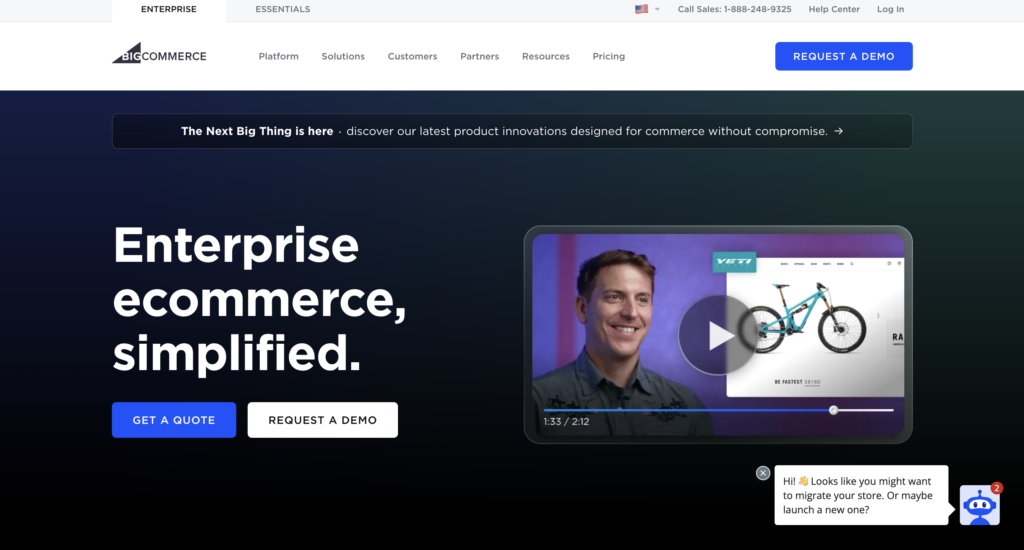
Looking for an ecommerce platform that will help your business grow? BigCommerce stands out in 2024 with its user-friendly tools, robust features, and scalability, making it a top choice for businesses of all sizes.
Why BigCommerce for 2024?
1. Scalability
BigCommerce allows businesses to scale effortlessly. Whether you’re starting out or expanding, the platform handles increased traffic and inventory growth seamlessly without sacrificing performance.
2. Customization Options
BigCommerce offers professionally designed templates that you can easily customize using their drag-and-drop functionality. This allows non-technical users to create visually appealing storefronts aligned with their brand.
3. Technical Performance
Optimized for speed and security, BigCommerce ensures fast-loading websites, secure hosting, and robust security features like SSL encryption and a built-in content delivery network (CDN) to protect against cyber threats.
4. Advanced SEO Features
BigCommerce excels in search engine optimization (SEO) with features like customizable URLs, meta tags, and XML sitemaps. These tools are designed to boost your website’s visibility on search engines and drive more organic traffic.
5. Integrations and Marketing Tools
BigCommerce integrates with major payment gateways, shipping providers, and third-party applications. These integrations streamline operations, while advanced marketing tools enhance customer engagement and drive sales.
Summary
For businesses seeking a scalable, customizable, and technically advanced ecommerce platform, BigCommerce delivers in 2024. Its ease of use, security, SEO capabilities, and integrations make it an ideal solution for building and growing online stores. Choose BigCommerce to provide an exceptional shopping experience and thrive in the competitive ecommerce landscape.
3 – Adobe Commerce (formerly Magento)
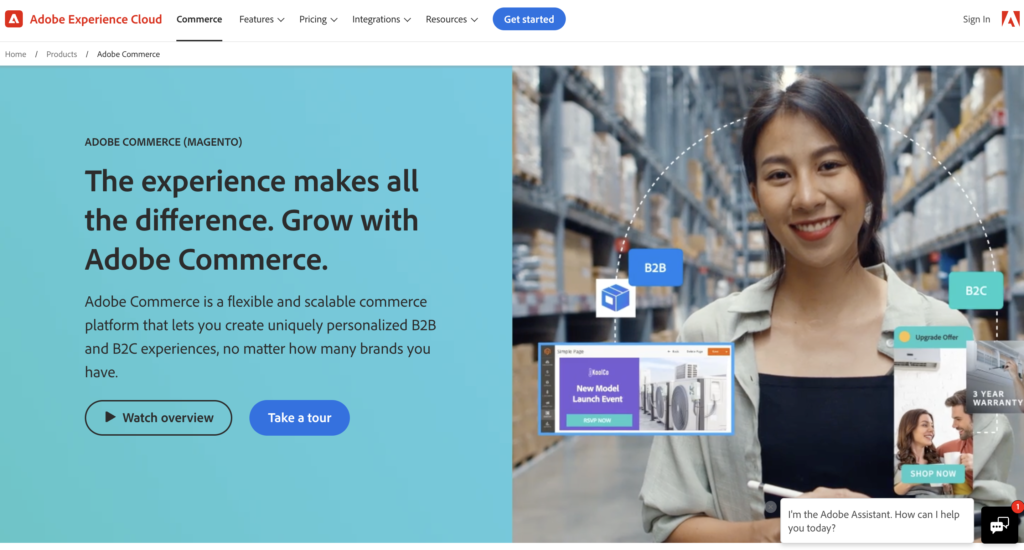
Looking for the best platform to scale your ecommerce business in 2024? Adobe Commerce (formerly Magento) stands out with its robust features, flexibility, and powerful integrations designed to help businesses thrive in the competitive online market.
Why Choose Adobe Commerce?
1. Exceptional Customer Experience
Adobe Commerce excels in delivering personalized shopping experiences. It offers tools like customizable themes, responsive web design, and personalized product recommendations. These features help businesses create an engaging and intuitive shopping environment, keeping customers loyal and boosting conversion rates.
2. Scalability for Growing Businesses
One of Adobe Commerce’s key strengths is its scalability. Whether you’re a startup or a large enterprise, the platform handles high traffic volumes without compromising speed or performance. With robust inventory management tools, it allows you to track products across multiple channels efficiently.
3. Marketplace and Extensions
Adobe Commerce boasts a vast marketplace with numerous extensions and integrations. Whether you need advanced analytics, SEO optimization, or social media tools, these integrations tailor your online store to meet specific business needs, helping you gain insights and drive more organic traffic.
4. Security and Compliance
Security is a priority with Adobe Commerce, offering robust protection of customer data through SSL encryption and compliance with global regulations like GDPR. This not only ensures safe transactions but also builds customer trust and boosts your store’s credibility.
Summary
For businesses looking to excel in 2024, Adobe Commerce is the ideal platform. With its unmatched flexibility, scalability, marketplace of powerful tools, and top-tier security, it equips you to build a successful online store and meet evolving customer expectations.
Choose Adobe Commerce to take your ecommerce business to new heights in 2024.
4- WooCommerce The Leading Ecommerce Platform for 2024
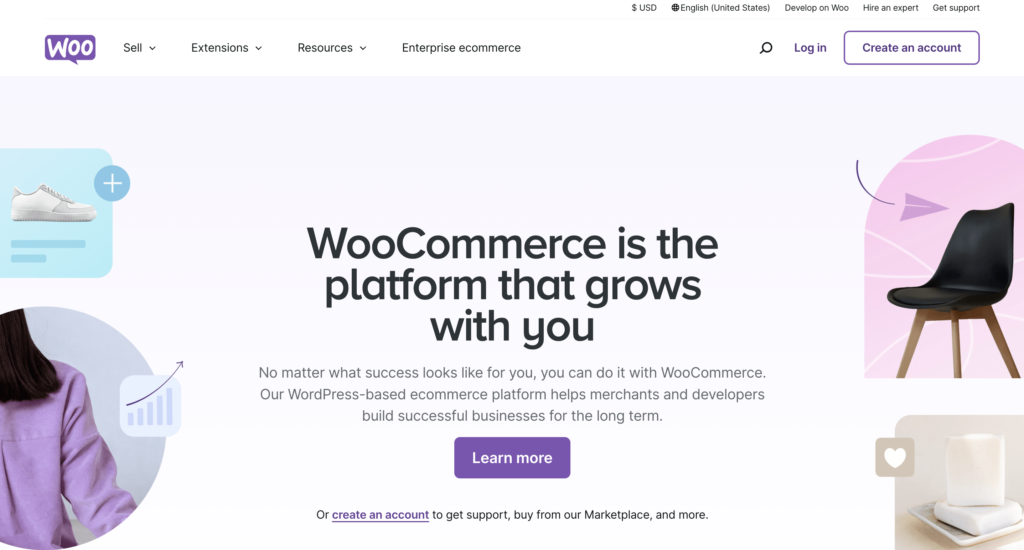
In 2024, businesses need flexible and reliable ecommerce solutions. WooCommerce continues to stand out for its deep integration with WordPress, scalability, and customizable features, making it an ideal choice for businesses of all sizes.
Why WooCommerce in 2024?
1. Versatility and Scalability
WooCommerce serves businesses ranging from startups to large enterprises. With thousands of plugins and extensions, store owners can easily add features like inventory management, advanced shipping options, and marketing tools. This scalability ensures WooCommerce grows alongside your business, adapting to its evolving needs.
2. WordPress Integration
Built on WordPress, the most widely used website platform, WooCommerce seamlessly integrates into existing WordPress websites. Businesses can customize their stores with a vast selection of themes and plugins, ensuring a tailored user experience and SEO optimization for better search engine visibility.
3. User-Friendly Interface
Even with limited technical skills, merchants can manage their stores efficiently through WooCommerce’s intuitive dashboard. Adding products, tracking sales, and processing orders are straightforward tasks, empowering business owners to run their ecommerce operations with ease.
4. Robust Security
Security is a top priority. WooCommerce is frequently updated, supported by a dedicated security team. SSL certificates, secure payment gateways, and regular security patches protect both merchant and customer data, providing a trusted shopping environment.
5. Strong Support and Community
WooCommerce has a vast global community of developers and users who offer extensive support. Whether through online forums, tutorials, or developer resources, businesses have access to troubleshooting and updates that help keep them ahead in the ever-evolving ecommerce space.
Summary
For 2024, WooCommerce remains a top choice due to its unmatched flexibility, deep WordPress integration, user-friendly interface, and robust security features. It’s a platform capable of evolving with your business, ensuring you remain competitive in the fast-paced digital marketplace.
5- Squarespace

If you’re seeking an intuitive and robust ecommerce platform in 2024, Squarespace is a top contender. It blends ease of use, stunning visual design, and powerful ecommerce features, positioning itself as an excellent choice for businesses looking to thrive online.
Key Features of Squarespace
1. User-Friendly Interface
Squarespace excels with its simple, drag-and-drop builder, allowing users—whether beginners or seasoned professionals—to design and manage their online stores easily. Its intuitive dashboard lets you customize your website’s look and functionality without requiring technical expertise, making it perfect for those with limited coding skills.
2. Stunning Templates
A hallmark of Squarespace is its collection of professionally designed, responsive templates. These templates are ideal for various industries—whether you’re selling clothing, electronics, or artisanal products. They’re fully customizable, allowing you to create a visually striking online store that adapts flawlessly to any device.
3. Robust Ecommerce Features
Squarespace offers a range of features tailored to ecommerce success:
- Secure payment gateways (like PayPal and Stripe).
- Inventory management for tracking stock and orders.
- SEO optimization tools built into the platform, ensuring your store ranks well in search engine results.
These features ensure your store not only looks great but also functions smoothly, providing customers with a seamless shopping experience.
4. 24/7 Customer Support
What sets Squarespace apart is its 24/7 customer support. Whether you’re dealing with a technical issue or need guidance in setting up your store, Squarespace’s team is available to help, giving you peace of mind as you scale your online business.
Summary
For 2024, Squarespace stands out as a premier ecommerce platform thanks to its ease of use, visually stunning templates, robust features, and dependable support. Whether you’re a small business or looking to scale up, Squarespace provides everything you need to create a thriving online store. Ready to get started? Explore Squarespace and unlock new possibilities for your ecommerce venture.
6- Big Cartel Top Ecommerce Platform for Artists in 2024

Are you an artist or creative entrepreneur looking to sell your unique products online? Look no further than Big Cartel—the best ecommerce platform for artists in 2024. Designed with simplicity and creatives in mind, Big Cartel is perfect for those seeking a streamlined and effective platform to showcase their work.
Why Choose Big Cartel?
1. Simplicity and User-Focused Design
Big Cartel’s main strength lies in its simplicity. Unlike ecommerce platforms designed for mass markets, Big Cartel caters specifically to artists, providing an easy-to-use, intuitive interface. Even without technical skills, you can set up a visually appealing store within minutes. This lets you focus on your creative work rather than the technical aspects of ecommerce.
2. Tailored for Creatives
Big Cartel provides a selection of customizable templates and themes that emphasize your artistic style. Whether you’re a painter, photographer, jewelry designer, or another type of artist, you’ll find templates that enhance your brand identity and make your products stand out. Its design flexibility helps create a professional yet personalized online storefront.
3. Secure Payment Integration
Big Cartel integrates seamlessly with leading payment gateways like Stripe and PayPal, providing a secure environment for transactions. This ensures that both you and your customers can trust the platform for safe payments. You can also link your store to your social media accounts, extending your reach across multiple platforms.
4. SEO Optimization and Marketing
Optimized for search engines, Big Cartel helps you increase visibility and drive organic traffic to your store. The platform enables easy implementation of SEO techniques like adding meta tags, optimizing titles, and creating SEO-friendly URLs. These features allow you to rank higher on search engines, ultimately boosting your sales potential.
5. Affordable Pricing Plans
Big Cartel offers flexible pricing plans, catering to both beginners and established businesses. Its plans are affordable, with no transaction fees, helping you maximize profits while keeping overhead costs low. Whether you’re just starting out or expanding, Big Cartel supports your growth goals.
Summary
For artists and creative entrepreneurs, Big Cartel stands out as the top ecommerce platform in 2024. Its combination of simplicity, customization options, secure payment systems, SEO-friendly features, and affordable pricing makes it the perfect choice for those looking to showcase and sell their work. Join Big Cartel today to take your art business to the next level.
7- Square Online
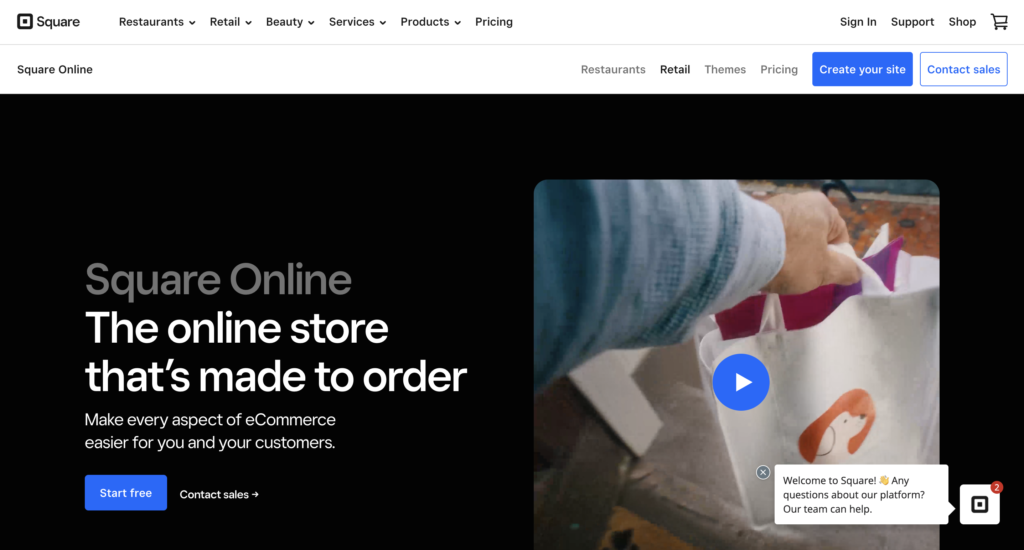
When choosing the right ecommerce platform, Square Online stands out as a top contender in 2024. It provides businesses with an easy, effective solution for building and managing their online stores, integrating ecommerce features with Square’s trusted payment system.
Key Features and Benefits
- Seamless Payment Integration Square Online’s biggest advantage is its integration with Square’s payment processor. This means businesses get a secure, seamless checkout experience that boosts customer confidence and reduces friction during transactions.
- Customizable Designs Square Online offers professionally designed templates that are fully customizable. You can tailor your store’s look by adjusting color schemes, adding logos, and personalizing content to align with your brand.
- User-Friendly Interface Even those with little technical know-how can quickly manage their store. The dashboard is intuitive, allowing easy inventory tracking, sales monitoring, and access to customer insights for better decision-making.
- SEO Optimization Optimized for SEO, Square Online makes it simple to incorporate relevant keywords naturally into product descriptions, titles, and landing pages. This improves your store’s search engine ranking, making it easier for customers to discover your products organically.
- Marketing Tools Square Online goes beyond ecommerce with powerful marketing tools. It enables email marketing campaigns, social media integrations, and other features to reach a broader audience, drive repeat business, and engage with customers.
Conclusion
Square Online offers the complete package for businesses seeking a robust ecommerce platform. Its payment integration, customizability, and marketing features make it an excellent choice in 2024. Whether you’re a startup or established business, Square Online equips you with the tools to grow your online presence and reach more customers.
8- Shift4Shop

In 2024, Shift4Shop stands out as the premier eCommerce platform. This versatile solution is designed for businesses of all sizes, offering a seamless experience for both merchants and customers.
A reliable eCommerce platform is essential for success. Shift4Shop excels by providing a comprehensive suite of features that empower businesses in the digital landscape.
Key Advantages of Shift4Shop
- Flexibility: Whether you’re a small startup or an established enterprise, Shift4Shop adapts to your needs. With numerous customizable templates, you can create a visually appealing online store that reflects your brand. The intuitive drag-and-drop interface makes designing your website simple and efficient.
- Robust Inventory Management: Shift4Shop’s inventory system allows you to manage products effortlessly. Track stock levels and set up automated alerts for low inventory, ensuring you maintain optimal stock and customer satisfaction.
- Powerful Marketing Tools: Drive traffic and boost conversions with built-in SEO tools and email marketing campaigns. These resources help you effectively reach and engage your target audience.
- Seamless Payment Integration: Shift4Shop works with various payment gateways, offering customers multiple payment options. This flexibility enhances convenience and security, fostering trust and increasing sales.
- Exceptional Customer Experience: Shift4Shop prioritizes user experience. Features like customer reviews, personalized recommendations, and easy navigation enhance shopping satisfaction.
Shift4Shop excels in functionality, flexibility, and user-friendliness. This platform meets the diverse needs of businesses, making it the ideal choice for eCommerce in 2024. Elevate your online business with Shift4Shop today!
9- Volusion

In 2024, Volusion stands out as a leading eCommerce platform for businesses. Its robust features, user-friendly interface, and extensive customization options make it an ideal choice for entrepreneurs looking to build and grow their online stores.
Why Choose Volusion?
- Ease of Use: Volusion empowers businesses to create stunning storefronts without needing technical skills. With a variety of professional templates, customization is straightforward, catering to both tech-savvy users and beginners.
- Advanced SEO Capabilities: Volusion understands the importance of search engine optimization (SEO) in driving organic traffic. Built-in features like keyword optimization, meta tags, and customizable URLs help improve search engine rankings, leading to better visibility and higher conversion rates.
- Robust Inventory Management: Effortlessly manage your product catalog with Volusion’s inventory tools. Track stock levels and set up automated reordering, ensuring you never run out of products. Integration with popular payment gateways simplifies the checkout process for your customers.
- Comprehensive Analytics: Volusion provides detailed analytics and reporting features, enabling data-driven decisions that optimize your online store’s performance.
- Exceptional Customer Support: With 24/7 support via live chat, email, and phone, Volusion addresses your questions promptly. This commitment to customer service instills confidence, knowing you have a reliable partner in your eCommerce journey.
Conclusion
When selecting an eCommerce platform in 2024, Volusion is a top contender. Its user-friendly design, advanced SEO features, robust inventory management, and exceptional support empower businesses to thrive online. Unlock the potential of your online store with Volusion today!
10- OpenCart

Are you searching for the best eCommerce platform to elevate your online store? OpenCart is a top contender in 2024. With its user-friendly interface and comprehensive features, OpenCart provides a seamless experience for store owners and customers alike.
Key Features of OpenCart
- Simplicity and Flexibility: OpenCart is known for its straightforward setup and flexibility. Its intuitive admin panel allows users to configure and customize their stores easily, catering to both tech-savvy entrepreneurs and novices.
- Extensive Library of Themes and Modules: Enhance your store’s look with OpenCart’s vast selection of professionally designed themes. The platform also offers numerous modules to add functionalities like payment gateways, shipping methods, and marketing tools, ensuring a convenient shopping experience.
- Search Engine Optimization (SEO): OpenCart excels in SEO capabilities. Built-in features enable you to optimize product pages, meta tags, and URLs, making it easier for search engines to index your site. This boosts organic traffic and improves your online visibility.
- Scalability and Performance: OpenCart supports your growth, whether you’re starting small or planning for a larger enterprise. Its efficient caching system and lightweight architecture ensure fast loading times, reducing bounce rates and enhancing customer satisfaction.
Conclusion
In 2024, OpenCart stands out as a leading eCommerce platform. Its user-friendly interface, extensive customization options, strong SEO capabilities, and scalability make it an excellent choice for entrepreneurs. Embrace the power of OpenCart and watch your online store thrive in the dynamic digital landscape.
What Types of E-Commerce Platforms Are There?
In today’s digital landscape, eCommerce is vital for businesses seeking to reach global audiences and maximize sales. With many options available, choosing the best eCommerce platform for 2024 or the best website builders today can be challenging. Here’s a breakdown of the different types of eCommerce platforms to help you make an informed decision.
- Self-Hosted Platforms
These platforms offer complete control and flexibility for your online store. By hosting your own site, you can customize it to meet specific business needs. Popular self-hosted options include WooCommerce and Magento, both offering extensive features and functionalities. - Hosted Platforms
Ideal for small to medium-sized businesses, hosted platforms like Shopify and BigCommerce provide an all-in-one solution. These platforms include web hosting, security, and payment processing, making it easy for entrepreneurs to set up their stores quickly with user-friendly interfaces and templates. - Open-Source Platforms
For those prioritizing customization, open-source platforms such as PrestaShop and OpenCart are great choices. They give developers access to the source code, allowing for modifications and feature additions tailored to individual business needs. - Cloud-Based Platforms
Cloud-based options like Volusion and Squarespace require no software installation, allowing easy access to your online store from anywhere. These platforms offer scalability and secure hosting, making them suitable for high-traffic websites. - Mobile Commerce Platforms
With the rise of smartphone usage, having a mobile-optimized store is essential. Mobile commerce platforms like MobiCart and TapCart specialize in creating mobile apps for your eCommerce store, ensuring seamless shopping experiences for users on the go. - Marketplace Platforms
Marketplace platforms such as Amazon and eBay let businesses tap into established customer bases. By listing products on these platforms, businesses can gain visibility and reach a broad audience quickly.
Choosing an E-Commerce Platform: Essential Features Checklist
Selecting the right eCommerce platform is crucial for your business’s success. This checklist outlines the key features to consider when choosing a platform for 2024 and beyond.
1. Scalability
Your platform should grow with your business. Look for one that easily accommodates an increasing number of products, traffic, and transactions. Ensure it offers options to upgrade server resources as needed.
2. Security
Protecting your customers’ sensitive information is paramount. Choose a platform with robust security features like SSL certificates, secure payment gateways, and regular security updates to safeguard your business and customers.
3. Mobile Responsiveness
With many shoppers using smartphones and tablets, your eCommerce platform must have a responsive design. This ensures a seamless user experience across various devices, maximizing your potential customer base.
4. Payment Gateway Options
Different customers prefer different payment methods. Select a platform that supports a variety of payment gateways, such as PayPal, Stripe, and Amazon Pay, to accommodate diverse customer preferences.
5. Ease of Use
A user-friendly platform is essential. Look for features like drag-and-drop builders, intuitive content management systems (CMS), and customizable templates to simplify store management, even for those without technical skills.
6. Integration Capabilities
Your platform should easily integrate with essential tools and services, such as accounting software, inventory management systems, and email marketing platforms. This streamlines workflows and reduces manual data entry.
7. Customer Support
Reliable customer support can make a significant difference. Opt for platforms that provide 24/7 assistance through various channels, including live chat, email, and phone, ensuring help is available when you need it.
Conclusion
When selecting an eCommerce platform, prioritize scalability, security, mobile responsiveness, payment options, ease of use, integration capabilities, and customer support. By evaluating these features, you can choose the best platform that aligns with your business goals and ensures a smooth shopping experience for your customers in 2024 and beyond.
Choosing an eCommerce Platform: Aligning with Business Needs
Selecting the right eCommerce platform is vital for your success in the online marketplace. With numerous options available, it can be overwhelming to determine which platform best suits your business needs. This guide will help you navigate this decision by focusing on key aspects of your requirements.
Identify Your Business Needs
Every business is unique, with different priorities, goals, and target audiences. Start by identifying your specific needs to narrow down your options and find the ideal platform.
Scalability
Consider the scalability of the platform. Your business will likely grow, so choose a solution that can adapt to your evolving needs. Look for platforms that offer easy integration with additional features and plugins.
Design and Customization
Your website should reflect your brand identity. A visually appealing and user-friendly design enhances customer experience and drives conversions. Select a platform that provides a variety of design templates and customization options.
Secure Payment Integration
A seamless payment process is crucial. Your chosen platform should offer multiple payment options and ensure secure transactions to build customer trust. Additionally, evaluate how the platform manages inventory, order fulfillment, and shipping.
SEO Capabilities
Robust search engine optimization (SEO) features are essential for attracting organic traffic. Ensure the platform supports customizable meta tags, URLs, and content optimization to improve your search engine rankings and increase visibility.
Customer Support
Consider the level of customer support and available resources. As a business owner, you may encounter technical issues or need guidance. A responsive support team and comprehensive documentation can be invaluable.
Choosing the right eCommerce platform requires careful evaluation of your specific needs. Focus on scalability, design customization, payment integration, SEO capabilities, and customer support. The ideal platform will be adaptable, user-friendly, secure, and capable of providing a seamless online shopping experience. By making an informed decision, you can position your business for long-term success in the competitive eCommerce landscape.
Know Your Costs: The Financial Side of eCommerce Platforms
Understanding your costs is vital when building and managing an online business. eCommerce platforms offer various features and pricing structures. By knowing your costs, you can make informed decisions, optimize your budget, and maximize profitability. This guide explores the factors influencing pricing, highlights hidden fees, and offers insights to help you navigate the financial aspects of your online business.
Pricing Models
Start by evaluating the pricing model of each platform. Most eCommerce platforms use tiered pricing plans, catering to businesses of different sizes. These plans often range from basic to advanced, each with unique features and limitations. Identify your business needs to select a plan that balances cost and functionality.
Transaction Fees
In addition to subscription fees, be aware of any transaction fees. Some platforms charge a percentage of each sale, while others have flat-rate fees. Factor in these costs when estimating your overall expenses, especially if you expect high sales volumes.
Scalability Costs
Consider scalability as your business grows. Your eCommerce platform should handle increasing traffic and sales. Many platforms offer scalability options, often at an additional cost. While you may not need advanced features initially, understanding the pricing structure for future growth is essential.
Hidden Fees
Hidden fees can surprise online business owners. Be proactive in identifying these charges, which may include fees for extra features, integrations, or customizations. Carefully review pricing details and terms to avoid unexpected costs.
Balance Cost and Quality
While cost is crucial, it shouldn’t be your only consideration. Assess the platform’s reliability, security features, user-friendliness, and customer support. Finding the right balance between cost and quality is key to long-term success.
Consider Your Future Business Plans
In today’s digital age, leveraging eCommerce platforms is vital for expanding your business and maximizing profits. Before diving into online sales, carefully consider your future business plans.
Choose the Right eCommerce Platform
Selecting the right eCommerce platform is crucial for long-term success. With numerous options available, analyze each platform’s features, pricing, and scalability. Assess your specific needs, such as the number of products you plan to sell, required customization, and integration capabilities with other tools.
Understand Your Target Audience
Know your audience and their preferences. Conduct thorough market research to identify trends and customer behaviors. This information will help you tailor your eCommerce platform to meet their needs, ensuring a seamless user experience and higher conversion rates. Incorporate features like personalized product recommendations, easy navigation, and secure payment options.
Prioritize Search Engine Optimization (SEO)
Enhancing your online visibility is essential for attracting customers. Optimize your website with relevant keywords in product descriptions, blog posts, and meta tags. Improve your site’s structure, load speed, and mobile-friendliness to boost search engine rankings and provide a satisfying experience.
Use Compelling Storytelling
Engage your audience through storytelling. Share your business journey, values, and the stories behind your products. Persuasive narratives can convince potential customers of the value of your offerings. Providing insights on industry trends will position your business as a thought leader.
Plan for Growth and Scalability
Anticipate future growth when selecting an eCommerce platform. Choose one that can adapt to increased traffic and transactions. Look for analytics and reporting features that offer insights into visitor behavior, sales trends, and marketing performance. This data will inform your decisions and optimize strategies for sustainable growth.
Start Selling Online with Shopify
Are you ready to elevate your business? Looking for a reliable, user-friendly platform to start selling online? Shopify is your answer! With its intuitive interface and robust features, Shopify empowers entrepreneurs to establish a strong online presence and maximize sales.
Why Choose Shopify?
Shopify is a leading eCommerce platform that caters to businesses of all sizes. Whether you’re a small startup or an established brand, Shopify provides essential tools and resources to help you succeed.
Ease of Use
One of Shopify’s biggest advantages is its simplicity. You don’t need technical expertise to set up your store. The platform offers customizable themes and templates that reflect your brand, allowing you to create a visually appealing online store that captures your business’s essence.
Security and Reliability
Selling online requires a secure and dependable platform. Shopify handles hosting and security, ensuring your store is always operational. This allows you to focus on what matters most: growing your business and serving your customers.
Extensive App Store
Shopify boasts a vast app store with thousands of applications. These apps add functionality to your store, enhancing the shopping experience. From marketing and analytics to inventory management and customer support, these tools streamline operations and boost sales.
Drive Traffic and Increase Sales
Shopify includes built-in features to attract visitors and convert them into customers. Its powerful SEO tools help optimize your store’s visibility in search engine results, increasing organic traffic. Plus, Shopify integrates seamlessly with marketing channels like social media and email, allowing you to engage effectively with your audience.
Enhance Customer Experience
Creating a seamless, personalized shopping experience is crucial. Shopify offers features like abandoned cart recovery and product recommendations, helping you engage customers and increase sales. These tools can recover lost sales and encourage repeat business.
If you’re ready to start selling online, Shopify is the perfect platform. Its user-friendly interface, extensive features, and seamless integrations empower businesses to create compelling online stores that drive sales and delight customers. Don’t wait—sign up for Shopify today and unlock your business’s full potential in eCommerce!
Compare eCommerce Platforms
When setting up an online store, choosing the right eCommerce platform is crucial. This table compares popular platforms, highlighting their key features, pros, and cons to help you make an informed decision.
| Platform | Key Features | Pros | Cons |
|---|---|---|---|
| Shopify | User-friendly interface, customizable templates, secure payment gateways | Great for beginners; seamless integrations | Advanced features may incur additional costs |
| WooCommerce | Flexible and customizable, integrates with WordPress | Ideal for unique needs; vast plugin options | Requires technical expertise for management |
| BigCommerce | All-in-one solution, robust features, scalable | Suitable for all business sizes; excellent support | Pricing can be high for small businesses; limited customization |
| Magento | Extensive customizability, supports multiple currencies | Great for international markets; advanced SEO | Complex setup; requires technical expertise |
Ecommerce platforms FAQ
Are you thinking about starting an online store? You’ve come to the right place! Here’s essential information about ecommerce platforms to help you make an informed decision.
What are Ecommerce Platforms?
Ecommerce platforms are software solutions that provide all the necessary tools for online selling. They include features like product catalog management, order fulfillment, and marketing. These tools are crucial for establishing and growing your business, adapting to market needs effectively.
Which Ecommerce Platform Should I Choose?
Selecting the right ecommerce platform for your business involves considering several factors, such as budget, desired features, scalability, and ease of use. Popular platforms like Shopify, WooCommerce, Magento, and BigCommerce each offer unique strengths and weaknesses. It’s essential to research and compare them to find the best fit for your needs.
How Easy is it to Set Up and Manage an Online Store?
Setting up an online store is straightforward with the right ecommerce platform. Most platforms feature user-friendly interfaces and intuitive dashboards that simplify creating product listings, customizing your store’s design, and managing orders. Many also provide comprehensive documentation, tutorials, and customer support to guide you throughout the setup and management processes.
Are Ecommerce Platforms Secure?
Security is vital for any online business. Reputable ecommerce platforms implement robust security measures to protect your store and customer data from cyber threats. Look for platforms that offer SSL encryption, secure payment gateways, and regular security updates.
Can I Integrate Third-party Services with Ecommerce Platforms?
Absolutely! Most ecommerce platforms allow integrations with various third-party services, including shipping providers, payment gateways, accounting software, and email marketing tools. These integrations enhance your store’s functionality and streamline your operations.
Most Popular Ecommerce Platforms in 2024
Ecommerce Platforms: Empowering Online Retail Success
Ready to elevate your business and tap into the power of online retail? Ecommerce platforms provide everything you need to build, launch, and manage a successful online store. In this guide, we’ll explore the most popular platforms and their standout features, helping you find the right fit for your business needs.
1. Shopify: A Leader in Online Retail
Shopify is a global favorite, offering a user-friendly interface and customizable templates. It allows seamless integration with payment gateways and supports multiple languages, making it perfect for international businesses. Shopify’s app store lets you extend your store’s functionality to meet your business needs, from marketing to inventory management.
2. WooCommerce: Powering WordPress Ecommerce
WooCommerce is the go-to ecommerce platform for WordPress users. It integrates smoothly with WordPress, offering flexibility and customization through various plugins. With a vast community and easy-to-use interface, WooCommerce is ideal for businesses of any size that already leverage the power of WordPress.
3. BigCommerce: Built for Growth
BigCommerce is designed for businesses looking to scale. Known for its robust features, it offers advanced SEO tools, intuitive product management, and marketing capabilities. BigCommerce’s flexible pricing plans and strong customer support make it a top choice for companies aiming for growth.
4. Magento: The Powerhouse of Flexibility
Magento is an open-source platform offering ultimate customization and flexibility for large-scale businesses. While it requires more technical expertise, its features, like multi-store support, advanced SEO, and performance analytics, make it ideal for ambitious retailers seeking high performance and scalability.
5. Volusion: Simplicity Meets Functionality
Volusion is perfect for users seeking simplicity with robust features. Its user-friendly interface, responsive templates, secure payment gateways, and comprehensive inventory tools make it a popular option for businesses of all sizes. With competitive pricing, Volusion is an accessible solution for any retailer.
Is Amazon an Ecommerce Platform?
Yes, Amazon is an ecommerce platform. As one of the world’s largest online retailers, it connects buyers and sellers globally. Amazon allows businesses to sell products alongside its own inventory, reaching millions of customers through programs like Amazon Marketplace and Fulfillment by Amazon (FBA).
Amazon’s ecommerce platform offers secure transactions, a trusted payment system, and a vast selection of products across categories. Its user-friendly interface, personalized recommendations, and seamless shopping experience make it a go-to destination for millions of consumers. With a global presence and efficient logistics, Amazon dominates the international ecommerce market.
Which Ecommerce Platform is Best for Startups?
Are you a startup entrepreneur ready to launch your ecommerce venture? Choosing the right platform is key to ensuring your success. This guide will help you navigate the process of selecting the best ecommerce platform for your startup.
When selecting an ecommerce platform, remember: there’s no one-size-fits-all solution. Each platform offers different features, pricing, and user experiences. Understanding your startup’s needs and matching them with the right platform is essential.
1. Scalability Matters
As a startup, growth is a top priority. Choose an ecommerce platform that scales with your business. Look for flexible plans that allow easy upgrades or downgrades as your business evolves.
2. User-Friendliness
Starting in ecommerce can be daunting, so choose a platform that’s easy to navigate. Opt for one with intuitive interfaces, drag-and-drop builders, and comprehensive guides. A user-friendly platform lets you focus on growing your business rather than managing technical issues.
3. Mobile Responsiveness
With mobile shopping on the rise, a mobile-responsive website is essential. Select a platform that offers responsive themes to ensure seamless browsing on smartphones, tablets, and desktops.
4. Payment Gateway Integration
Smooth payment processing is vital. Look for platforms that integrate with popular payment gateways, offering secure, hassle-free checkouts for your customers.
5. SEO Features
To boost online visibility, choose a platform that supports search engine optimization (SEO). Key features include customizable URLs, meta tags, sitemaps, and integration with SEO tools or plugins.
6. Apps and Integrations
As your startup grows, you’ll need additional tools like email marketing, inventory management, and CRM integration. Pick a platform with a wide range of apps and seamless integrations to simplify operations as you scale.
7. Cost Considerations
Budget is always a concern for startups. Compare the pricing models of different platforms—some charge monthly fees, while others take a percentage of transactions. Factor in your expected sales volume and other costs before making your decision.
Global Impact: How Ecommerce Platforms Shape the World
In our digitally connected world, the global impact of ecommerce platforms is undeniable. As the internet breaks down barriers, ecommerce platforms like Amazon, Alibaba, and eBay have transformed global trade and economic growth. These platforms now power international commerce, enabling businesses of all sizes to reach new markets and fostering competition across industries.
1. Expanding Global Reach
Ecommerce platforms connect buyers and sellers worldwide. With advanced search algorithms, they allow small businesses to extend their customer base beyond local borders. This levels the playing field, giving startups the chance to compete with larger players in the global marketplace.
2. Empowering Global Entrepreneurs
Platforms like Shopify and Etsy have democratized global commerce. Entrepreneurs and individuals can now become global merchants with ease, creating online stores that allow them to sell products to customers worldwide. This accessibility promotes economic inclusion, creating opportunities for micro-entrepreneurs everywhere.
3. Facilitating Cross-Cultural Exchange
Ecommerce platforms also encourage cultural exchange. By providing access to products from around the world, they expose consumers to new cultures and traditions, fostering appreciation and building a more interconnected global community.
4. Disrupting Traditional Business Models
Ecommerce has disrupted traditional retail models, forcing brick-and-mortar stores to adapt. This digital shift has driven innovation, created jobs, and fueled economic growth across multiple sectors.
5. Transforming Daily Life
Beyond business, ecommerce platforms have reshaped everyday life. From buying essentials to booking travel and ordering food, these platforms offer convenience and efficiency like never before. Their role in modern life continues to expand, touching nearly every aspect of consumer behavior.
In conclusion, ecommerce platforms have revolutionized global commerce, democratized access to international markets, and contributed to cultural exchange. As digital connectivity grows, their influence on global trade and economic dynamics will only deepen.
Solutions to Optimize Your Ecommerce Platform
In today’s digital era, having a well-optimized ecommerce platform is key to business success. Whether you run a small startup or a large enterprise, your platform must operate efficiently to maximize revenue potential. Here’s how to optimize your ecommerce platform for peak performance.
1. The Importance of Ecommerce Platforms
Ecommerce platforms are the backbone of online stores. They provide essential tools for showcasing products, managing inventory, processing transactions, and interacting with customers. Choosing the right platform ensures a smooth user experience and a visually appealing storefront that resonates with your target audience.
2. Selecting the Right Platform
To find the best platform, consider factors like scalability, user-friendliness, SEO capabilities, and customization options. Flexible platforms that support your growth and marketing goals are essential for long-term success.
3. Seamless Integration and Customization
Your ecommerce platform should integrate easily with third-party apps like email marketing tools, CRM software, and inventory management systems. Customization options allow you to align your store’s design with your brand, creating a seamless, personalized shopping experience for customers.
4. Enhancing User Experience (UX)
A smooth, intuitive user experience is critical to keeping customers engaged. Choose a platform with mobile-responsive designs, easy navigation, and fast checkout processes. Reducing friction in the buying journey boosts conversions and strengthens customer loyalty.
5. Optimizing for SEO
Search engine optimization (SEO) is key to driving organic traffic. Make sure your platform supports SEO-friendly features like customizable URLs, meta tags, and easy integration with SEO tools. By incorporating relevant keywords into product descriptions, meta data, and URLs, you’ll improve your visibility on search engines and attract more customers.
6. Prioritizing Security and Payment Options
Security is crucial in ecommerce. Ensure your platform offers SSL encryption and secure payment gateways. Offering a variety of payment methods—such as credit cards, digital wallets, and alternative options—makes it easier for customers to complete purchases, improving conversion rates.
Conclusion
Optimizing your ecommerce platform involves more than just an appealing design. By focusing on scalability, seamless integration, UX, SEO, and security, you’ll create a platform that drives growth and customer satisfaction. Implement these solutions to turn your ecommerce platform into a powerful engine for success.
Expanding Your Ecommerce Platform to New Countries or Regions
Expanding your ecommerce business into a new country or region is an exciting opportunity with great potential. However, before you take the plunge, it’s essential to understand the unique factors of each market. This guide will help you assess key considerations when choosing the best country or region for your ecommerce platform.
1. Market Size
Evaluate the market size by analyzing population, internet penetration, and purchasing power. A country with a large population and high internet usage offers promising opportunities. Also, assess the buying behaviors, preferences, and needs of your target audience. Tailor your product offerings to align with local market demands.
2. Consumer Behavior
Understanding the buying habits of your target market is crucial. Consider factors such as preferred payment methods, delivery options, and customer service expectations, which vary by country. Conduct thorough market research to ensure your ecommerce platform is optimized to meet local preferences, creating a seamless shopping experience.
3. Cultural Nuances
Culture significantly influences consumer behavior. Customize your website, products, and marketing strategies to reflect local cultural values and sensitivities. Aligning with cultural norms builds trust, strengthens brand loyalty, and ensures your platform resonates with the local audience.
4. Infrastructure
A well-developed infrastructure is key to ensuring smooth ecommerce operations. Assess the country’s logistics, transportation networks, internet speed, and payment gateways. Efficient integration of these systems is vital for a positive user experience, leading to higher conversion rates.
5. Regulatory Frameworks and Competition
Stay informed about the local legal environment, including data privacy, taxation, and ecommerce regulations. Additionally, analyze the competitive landscape to identify opportunities or potential challenges. Local partnerships can help you navigate these complexities.
By thoroughly evaluating these factors, you can ensure your ecommerce platform succeeds in new markets. Success depends on understanding your target audience, adapting to cultural and behavioral patterns, and optimizing your platform’s infrastructure and services.
Expand your ecommerce business with confidence and unlock new opportunities for growth and success.
✉
Sign up to get the BEST of Minh’s Guide direct to your inbox.
By entering your email and clicking Sign Up, you’re agreeing to let us send you customized marketing messages about us and our advertising partners. You are also agreeing to our Terms of Service and Privacy Policy.
MINH MEDIA
American philosopher Ralph Waldo Emerson said: “Passion rebuilds the world for youth. It makes everything come alive and make sense.“
Building on shared Blog:
- Sharing Values
- Knowledge
- experience
- Contribute
- Creative
- Vision
- Orientation
- Civilized community

